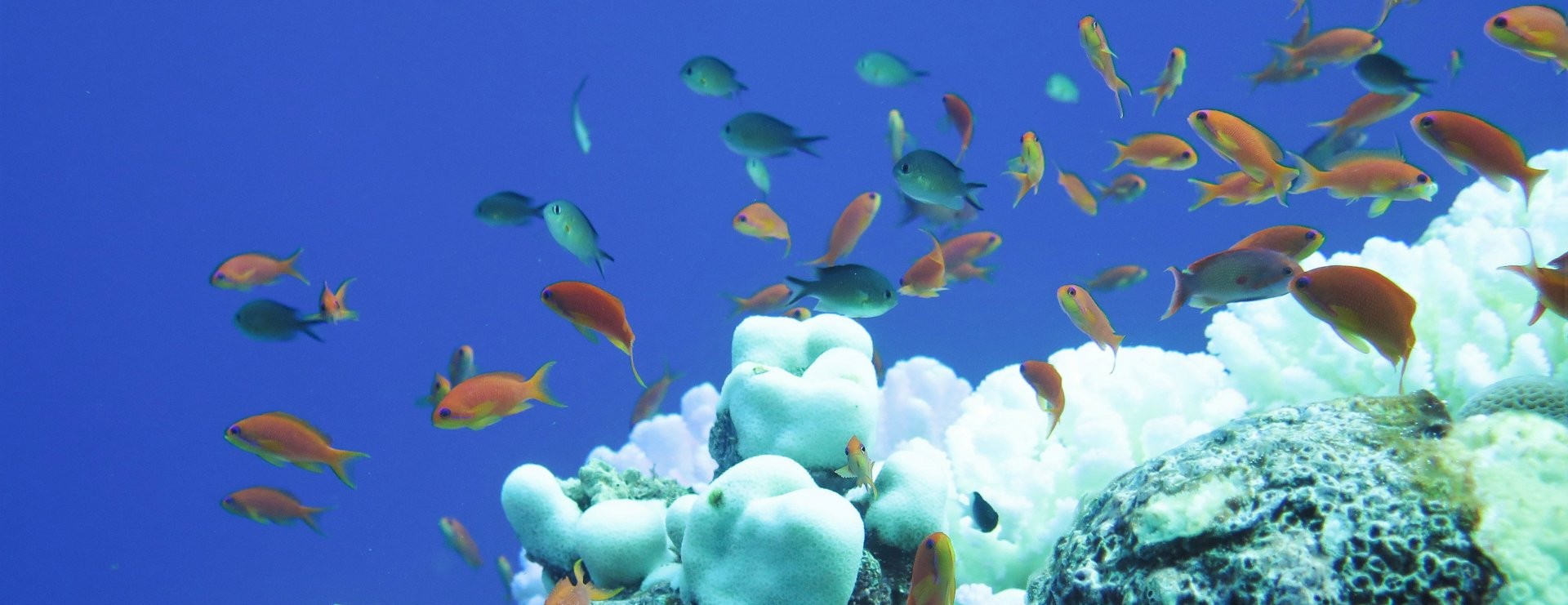- Press Office
- Press releases 2021
- One-two punch against corals: how stress factors interact
One-two punch against corals: how stress factors interact
Based on a press release from the Leibniz Centre for Tropical Marine Research (ZMT)
About a quarter of the carbon emissions driving global warming are absorbed by the oceans, leading to lower pH values in the water and making it more acidic. Global warming is also causing water temperature in the oceans to rise, which leads to the bleaching of coral reefs worldwide. Now, a new study reveals that increased CO2 levels in the water and ocean warming can interact to threaten reef-building corals.
The international team of authors, led by the University of California, included Dirk de Beer from the Max Planck Institute for Marine Microbiology in Bremen, Germany, as well as scientists from the Leibniz Centre for Tropical Marine Research (ZMT) in Bremen and the Alfred Wegener Institute, Helmholtz Centre for Polar and Marine Research (AWI) in Bremerhaven.
Acidification and warming are a one-two punch that affects corals' ability to form and grow calcium carbonate skeletons. The new study shows how these two factors interact to harm corals more than the sum of their effects would suggest.
The work, published in Science Advances, examined two coral species: the cauliflower coral (Pocillopora damicornis) and the hood coral (Stylophora pistillata), which live primarily in the tropical waters of the Indian and Pacific oceans. The series of experiments which took place at ZMT's seawater aquaria showed: when exposed to a temperature of 28 degrees Celsius both species were able to cope with higher concentrations of carbon dioxide and correspondingly higher acidity in the water. This temperature is within the optimal range for coral growth. With more carbon dioxide in the water, the corals grew even faster.
At 31 degrees Celsius, however, neither species showed significant growth at the pH levels tested by the researchers. For the cauliflower coral in particular the combined effect had a negative impact. The rising temperatures appeared to affect this coral's ability to regulate its internal acidity making it more vulnerable to the effects of ocean acidification.
"The interaction of stress factors is moving much more into focus of research," says Hildegard Westphal of ZMT. "With our study, we were able to show that temperature stress weakens the coral's ability to cope with elevated CO2 concentrations."
“The story is that CO2 decreases the seawater pH, as a result the calcium carbonate in the water is further from saturation. However, oversaturation is needed to precipitate calcium in the skeletons”, Dirk de Beer from the Max Planck Institute for Marine Microbiology explains. “Under most conditions, the corals are able to pump protons efficiently away from the skeleton, thus enhancing the pH at the skeleton. But that costs energy. With warming, they bleach, and thus loose their photosynthetic capacity to generate the extra energy to pump protons. The skeleton building comes to a stop.”
Reef researchers expect ocean heat waves to intensify in the coming decades, leading to extensive bleaching events. Coral reefs could suffer additional massive damage from the combined effect with increased CO2 levels. However, corals have also shown the ability to adapt to changing conditions to some extent. But this adaptation may come too late to save the world's major reef systems. Therefore, there is an urgent need to understand the interactions among stressors. Only then can ways be found to successfully protect corals.
Original publication
Maxence Guillermic, Louise P. Cameron, Ilian De Corte, Sambuddha Misra, Jelle Bijma, Dirk de Beer, Claire E. Reymond, Hildegard Westphal, Justin B. Ries, Robert A. Eagle (2020). Thermal stress reduces pocilloporid coral resilience to ocean acidification by impairing control over calcifying fluid chemistry. Science Advances 7(2), eaba9958, DOI: 10.1126/sciadv.aba9958
Link: https://advances.sciencemag.org/content/7/2/eaba9958/tab-pdf
Participating institutions
University of California, Los Angeles, USA
Université de Brest Occidentale, France
Northeastern University, USA
Woods Hole Oceanographic Institution, USA
The Leibniz Centre for Tropical Marine Research (ZMT), Germany
Indian Institute of Science, India
University of Cambridge, Cambridge, UK
Alfred-Wegener-Institut Helmholtz-Zentrum für Polar- und Meeresforschung, Germany.
Max Planck Institute for Marine Microbiology, Germany
China University of Geosciences, P. R. China
Bremen University, Germany
Contact
Group leader
MPI for Marine Microbiology
Celsiusstr. 1
D-28359 Bremen
Germany
|
Room: |
3202 |
|
Phone: |

Head of Press & Communications
MPI for Marine Microbiology
Celsiusstr. 1
D-28359 Bremen
Germany
|
Room: |
1345 |
|
Phone: |

